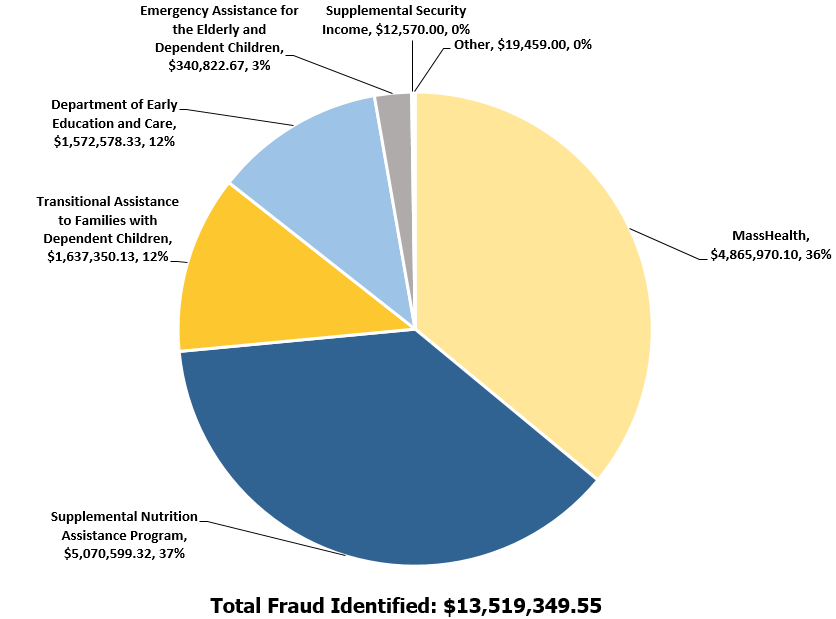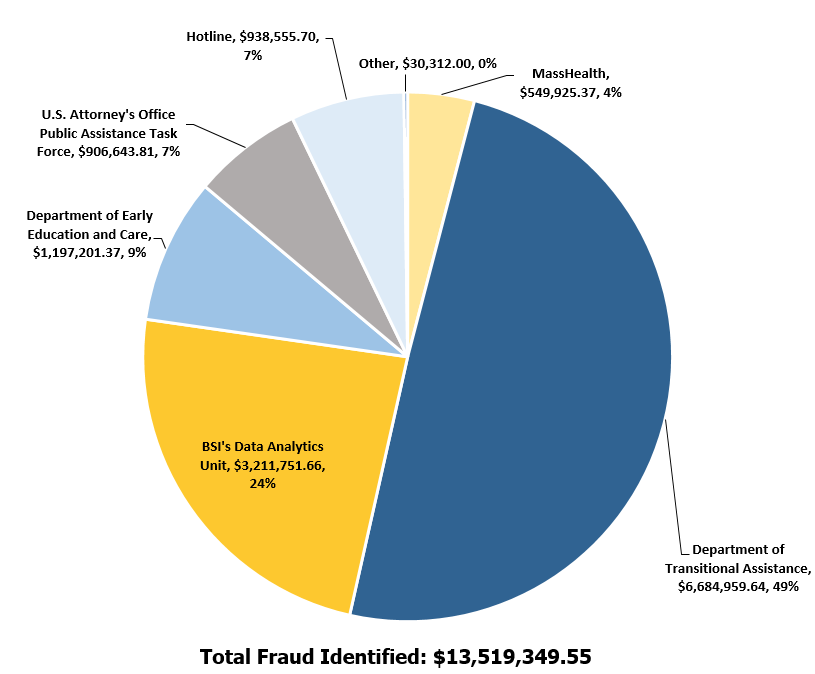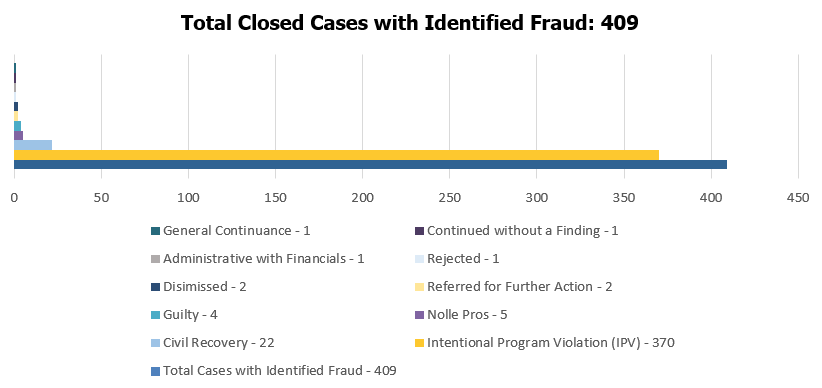Overview
Figure 1. FY22 Fraud Dollars Identified by Public Benefit Program
BSI By the Numbers
- 1,3304: BSI cases at the start of fiscal year 2022 (FY22)
- 5,191: New investigations
- 3,623: Total completed investigations
- 668: Completed investigations with identified fraud
- 2,898: BSI cases at the start of fiscal year 2023
Figure 2. FY22 Fraud Dollars Identified by Referral Source
Table 1. FY22 Caseload by Referral Source
|
Caseload |
Department of Early Education and Care |
Data Analytics |
MassHealth |
Department of Transitional Assistance |
Hotline |
Task Force |
Other |
Total |
|
Beginning Balance |
35 |
93 |
197 |
786 |
162 |
39 |
18 |
1,330 |
|
New Investigations |
24 |
393 |
872 |
3,050 |
833 |
12 |
7 |
5,191 |
|
Total Completed Investigations |
26 |
93 |
563 |
2,306 |
607 |
23 |
5 |
3,623 |
|
Completed with No Fraud |
4 |
7 |
477 |
776 |
503 |
4 |
2 |
1,773 |
|
Completed with Identified Fraud |
5 |
42 |
30 |
233 |
24 |
4 |
1 |
3395 |
|
Completed as Potential Intentional Program Violation |
0 |
0 |
31 |
1,089 |
61 |
0 |
1 |
1,182 |
|
Completed Pending Court/Non-Court/ Calculation6 |
17 |
44 |
25 |
208 |
19 |
15 |
1 |
3297 |
Closed Cases with Identified Fraud by Disposition
When BSI investigations are completed, BSI fraud examiners make determinations regarding the final resolutions of the cases, which may include referring the matter for prosecution, completing a civil recovery, or referring the matter for further action. Cases referred for prosecution are cases in which BSI files a criminal complaint against the subject(s) or refers the case to a district attorney’s office, the Attorney General’s Office, or the US Attorney’s Office.
All investigations that are completed and closed by BSI are considered closed cases, with or without identified fraud. In some cases, a closed case without identified fraud does not necessarily indicate that there was no fraud present, but rather that BSI was not able to obtain the necessary documentation to substantiate the fraud or that the individual was not receiving public assistance benefits during the period of the allegation. Closed cases are cases that have been adjudicated completely, for which BSI will not pursue any further action.
BSI uses different disposition codes to categorize closed investigations with identified fraud. The seven disposition codes are as follows:
- Intentional program violations, or IPVs, are cases that are returned to the DTA, MassHealth, or the Department of Early Education and Care to be handled administratively by those agencies.
- Administrative closing with financials are cases that are completed with an overpayment calculation, but recovery was not completed due to various factors (subject deceased, subject moved and BSI unable to locate, BSI error, etc.).
- Civil recovery cases are resolved through an agreement in which subjects agree to repay part or all of the fraudulently obtained benefits to the Commonwealth. Repayment terms must follow the originating agency’s rules and regulations.
- Continuance without a finding are completed cases with identified fraud that were referred for prosecution where the subject admits that there is sufficient evidence for a reasonable jury to find them guilty of the charged offense(s).
- General continuance are completed cases with identified fraud that were referred for prosecution where a general continuance has been ordered following either the subject’s guilty plea or a guilty verdict after a bench or jury trial.
- Guilty are completed cases with identified fraud that were referred for prosecution where the subject has either pleaded guilty or received a guilty verdict after a bench or jury trial.
- Dismissed are completed cases with identified fraud that were referred for prosecution where the court dismisses the case; the matter may be returned to the benefit program for further action.
- Refer for further action with financials are completed cases with identified fraud that were referred for further action; the matter may be referred to the Office of the State Auditor or another state agency for further action.
- Rejected are completed cases with identified fraud that were referred for prosecution where prosecution was declined prior to filing charges.
- Nolle Prosequi, or Nolle Pros, are completed cases with identified fraud that were referred for prosecution where prosecution was declined after filing charges before a verdict is rendered.
During FY22, BSI closed 409 cases with identified fraud and categorized them under the following disposition codes:
- 370 IPVs,
- 22 civil recoveries,
- 5 Nolle Pros,
- 4 guilty court dispositions,
- 2 refers for further action with financials,
- 2 dismissals with financials,
- 1 administrative closing with financials,
- 1 general continuance,
- 1 continuance without a finding, and
- 1 rejected.


